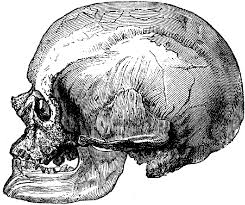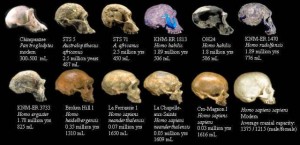The process of domestication seems to favor certain physical and behavioral traits, and tends to reliably result in a separate set of characteristics. Among the prerequisite traits are hierarchical and non-sex separated social groups, and being omnivorous. The standard phenotype for domesticated animals includes features such as reduced brain size, reduced fight or flight response, and a more juvenile appearance. What is curious is that modern humans exhibit at least one of these domesticated phenotype traits when compared to Paleolithic humans, reduced brain volume.
Melinda Zeder’s “Pathways to Animal Domestication” outlines a number of prerequisites and usual changes in domesticated species. One factor in which species were more likely to be domesticated I had not considered before was how the animal’s sexual signals were conveyed. Animals with displays based on coloring or physical attributes rather than attitudes or behaviors aren’t as well suited to being domesticated. This is because changes to the animals’ morphology, such as neoteny, could disrupt the animals’ reproductive cycle or viability. Monogamy is also undesirable for a domesticated species as it makes selective breeding harder to accomplish.
The reduction of brain volume of domesticated species when compared to their wild counterparts seems to be common among all mammalian domesticates, and more pronounced in animals with larger starting brain volumes. Moreover, the reduction is in general focused on parts of the forebrain, which is a more recently evolved structure, allowing for more complex thought. In this sense domesticates really are to some degree mentally retarded versions of their wild counterparts.
The average human brain volume increased until around 20,000 years ago. According to Cro-Magnon skulls found in Europe, our brain volume has decreased by approximately 10%. There are a number of theories about the implications and causes of this phenomena.
I think the causes are mainly, increased computational and informational storage ability outside of our own minds, and complex societies allowing us to be a little less intelligent. The increased cooperative nature of complex society may have allowed us to become slightly less intelligent, spreading the mental labor over more minds. In addition to calling on other people to solve problems, we have invented ways to solve problems partially or wholly outside of our brains. Taking written arithmetic as an example, to do calculations in your head is far more taxing than manipulating symbols written on clay tablets or paper. A more basic example based on memory would be the transition from spoken histories to written ones. To memorize the Iliad and be able to recite any part at will takes much more mental effort than writing it down and knowing how to read. The invention of written language and cooperative societies may be largely responsible for the reduction in brain volume.
A very modern extension of this phenomenon is the use of computers to complement human computation and memory retention. Cutting a person off from computers and the internet would cause them to lose access to the sum of human knowledge and experience. However, people raised with constant access to such resources, such as myself, are less able to complete tasks without this access. Anyone who has had computer issues in a dire situation knows that it feels almost like losing a limb. It is arguable that with internet connectivity so ubiquitous, we have outsourced some portion of our thinking power to computers, just as we have in the past with arithmetic and writing. I as an individual do not know everything about say domesticated pigeons, and my laptop doesn’t have the capacity to creatively and meaningfully interpret the information it has on pigeons, but as a system, we have both the knowledge and the capacity to interpret the information and produce something with meaning.
What this means for domestication is that when looking at the physical changes in humans that may imply we are becoming dumber, it is important to realize that you cannot separate humans from our technology. The reduction in our brain size is one side of an equation, and is balanced out by our increasing reliance on external thinking tools and cooperation with others.


I think that is a really interesting way to see the dependence we have on technology these days. While our brains have decreased we as a society continue to make breakthroughs everyday in science which is attributed to the technological era. I don’t encourage over dependency on technology because it does have negative effects but it is a incredibly beneficial resource and has helped human progress.
It would be interesting to see if monkeys or other species of animals could be bred to develop or rely on their own technology and domesticates. I remember reading about dolphins developing and spreading new fishing techniques among themselves. I would be interested in seeing the results of any concerted effort to breed an animal for greater brain volume. http://phys.org/news/2011-08-ingenious-fishing-method-dolphins.html
Oh I love this post because it ties two of my main interests — the human-animal relationship and the power of the internet together so well. Thank you! I can’t wait to talk about this more in class but just wanted to throw in a couple of things here: 1) the computer-internet is a technology but one of a fundamentally different sort than a “tool” (whether used by animal or human — and I loved the dolphin fishing article!). The internet puts the wisdom (and wisecracks) of a global network at your fingertips and makes any one individual “smarter” than their unplugged selves. 2) the relationship between brain size and intelligence is complicated (thankfully). Although I definitely support the humans as domesticates project, we need to be careful about making unilateral assertions about the brain size / intelligence issue. http://www.psychologytoday.com/blog/how-think-neanderthal/201309/does-brain-size-matter
Definitely an interesting topic. Makes me wonder if this unloading of our cognitive processes onto automated technologies and clouds will eventually leave us mindless, living blissfully in a world that does everything for us.
This is what I mean though when I say you cannot seperate us from the technology too much. In the scenario where we’re wholly dependent on the technology to think and act for us, we are it, or it is us. There is some very interesting sci fi around this topic, Learning to be Me is a good short story about technology and identity.
joidoijawod
Are you Searching for completely secure WordPress hosting? premix.host deliver completely secure WordPress hosting solutions for your site.
Thanks…. QlickBank #1 Exclusive Affiliate Marketing Network for 2022. Best Affiliate Programs For Publishers. Either As An Advertiser Acquire More Customers Today! Set Your Affiliate Marketing Goal with Qlick Bank – A Trade to Develop Performance Based Advertising for Advertisers / Vendors / Online Sellers.